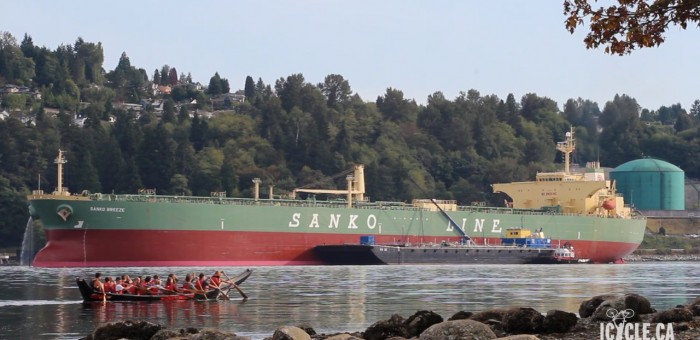Kinder Morgan’s “Casualty Data Survey”
This post is part of an ongoing series in which MLA Andrew Weaver will be sharing key information from inside the National Energy Board hearings on Kinder Morgan’s Trans Mountain pipeline proposal.
Many British Columbians are concerned about the risk of an oil spill on our coast.
That’s why my team and I went through the oil spill risk analysis provided in Kinder Morgan’s application. We wanted to see if the evidence Kinder Morgan offered gave British Columbians an honest take on the risks of this project.
There are a lot of sections to Kinder Morgan’s risk analysis—some are done quite well, others are deeply concerning. I will write more about these over the coming months.
Today, I would like to look at one report in particular. It offers a good example of the concerning way in which Kinder Morgan is approaching the review process.
Casualty Data Survey
As a part of its application, Kinder Morgan submitted a report done by Det Norske Veritas (DNV) titled a “Casualty Data Survey”. The report looked at the frequency of incidents involving oil tankers and compared the results to other types of vessels, such as chemical tankers and bulk carriers. Overall, the report is quite informative and gives a good sense of the frequency of incidents, including spills.
What is concerning is not the report itself, but the highly questionable conclusions that Kinder Morgan draws from the report. Let me offer an example:
In its pipeline application, Kinder Morgan makes the claim that “based on the available data, DNV shows that worldwide incident frequency involving oil tankers is among the lowest of all marine vessels for the period 2002 to 2011…”
I thought this was important, so I decided to ask about it.
Questioning the Claim
First of all, I found this claim interesting, since DNV only appeared to compare oil tankers with three other types of vessels: LNG-LPG Tankers, Chemical Tankers and Bulk Carriers.
I asked what data was theoretically available for comparison. It turns out that data was available for 19 different types of vessels. Kinder Morgan chose to only compare four types (including oil tankers) because it felt they provided the best basis for comparison.
That could be a fair judgment to make. But when they have only compared 4 of the 19 vessels types, they cannot then make the assertion that they have compared oil tankers to “all marine vessels”.
What makes it worse is that oil tankers don’t actually have the lowest number of incidents when compared to the other three vessel types. Oil tankers have the second highest frequency of “total loss” incidents (damaged beyond repair) and the third highest rate of “serious incidents”.
I asked Kinder Morgan to justify their claim in light of this evidence. In their response, they reiterated that their conclusion is “accurate”, but failed to address the contradictory evidence.
My Concern
Ultimately there is a bigger issue here than simply how an oil tanker compares to other marine vessels.
My concern is that this example is indicative of a trend we are seeing from Kinder Morgan. The company has made claims that are unsubstantiated by the information it provides in its application. When intervenors ask about these claims, Kinder Morgan avoids the question or refuses to give a clear answer.
An effective review process is predicated on openness and honesty. I am concerned that we are not seeing enough of either from Kinder Morgan.





One Comment
I wonder what the estimated suicide rate of the Kinder Morgan review staff will be in the future.Those might be interesting stats to bring up with them.